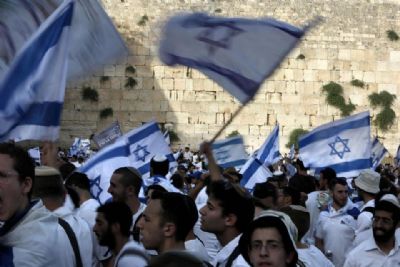"Amid the continuing controversy over the Obama administration's refusal to veto the Security Council's resolution regarding Israeli 'settlements,' it is important to understand why Israeli leaders across the political spectrum as well as American supporters of Israel - including many who oppose settlement expansion and favor a two-state solution - feel so negatively about this resolution.
Its text states that 'any changes to the 4 June 1967 lines, including with regard to Jerusalem' have 'no legal validity and [constitute] a flagrant violation under international law.' This resolution is not, therefore, limited to settlements in the West Bank. It applies equally to the very heart of Israel.
Before June 4, 1967, Jews were forbidden from praying at the Western Wall, Judaism's holiest site. They were forbidden to attend classes at the Hebrew University at Mt. Scopus, which had been opened in 1925 and was supported by Albert Einstein. Jews could not seek medical care at the Hadassah Hospital on Mt. Scopus, which had treated Jews and Arabs alike since 1918. Jews could not live in the Jewish Quarter of Jerusalem, where their forbearers had built homes and synagogues for thousands of years. These Judenrein prohibitions were enacted by Jordan, which had captured by military force these Jewish areas during Israel's War of Independence, in 1948, and had illegally occupied the entire West Bank, which the United Nations had set aside for an Arab state. When the Jordanian government occupied these historic Jewish sites, they destroyed all the remnants of Judaism, including synagogues, schools, and cemeteries, whose headstones they used for urinals. Between 1948 and 1967 the UN did not offer a single resolution condemning this Jordanian occupation and cultural devastation.
When Israel retook these areas in a defensive war that Jordan started by shelling civilian homes in West Jerusalem, and opened them up as places where Jews could pray, study, receive medical treatment, and live, the United States took the official position that it would not recognize Israel's legitimate claims to Jewish Jerusalem. That is why it refused to move the American embassy from Tel Aviv to Jerusalem. It stated that the status of Jerusalem, including these newly liberated areas, would be left open to final negotiations and that the status quo would remain in place. That is the official rationale for why the United States refuses to recognize any part of Jerusalem, including West Jerusalem, as part of Israel. That is why the United States refuses to allow an American citizen born in any part of Jerusalem to put the words 'Jerusalem, Israel' on his or her passport as their place of birth.
But that has now changed with the adoption of the Security Council Resolution. The UN has now determined that, subject to any further negotiations and agreements, the Jewish areas of Jerusalem recaptured from Jordan in 1967 are not part of Israel.
Instead, according to the resolution, they are territories being illegally occupied by Israel, and any building in these areas - including places for prayer at the Western Wall, access roads to Mt. Scopus, and synagogues in the historic Jewish Quarter - 'constitutes a flagrant violation under international law.' If that indeed is the status quo, absent 'changes . . . agreed by the parties through negotiations,' then what incentives do the Palestinians have to enter negotiations? And if they were to do so, they could use these Jewish areas to extort unreasonable concessions from Israel, for which these now 'illegally occupied' areas are sacred and nonnegotiable..."
December 27, 2016
The Consequences of Not Vetoing the Israel Resolution

Date
December 27, 2016
Title
The Consequences of Not Vetoing the Israel Resolution, The Boston Globe
Author(s)
Alan Dershowitz
Original Source
